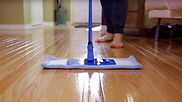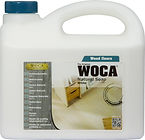


Hardwood Floor Care
Regular cleaning of your wood floor is a must. Sweep or vacuum (using the brush attachment) your floor often to remove any dirt or sand that may have been tracked in from outside. Left on the floor, these particles can scratch and dull the finish of virtually any product. Use interior and exterior doormats at all entrances to help to minimize the amount of dirt and grit tracked in. Area rugs are recommended in front of kitchen sinks, at all pivot points and within high traffic areas. Do not use rugs with solid rubber or vinyl backings. The rugs must be made of a breathable material to prevent moisture entrapment.
Floor felt protector pads should be used on the bottoms of furniture to eliminate scratches and gouges. Do not roll or slide heavy objects directly upon the floor. When moving appliances or heavy furniture, consider laying a heavy protective covering on your floor and gently walk the item across it.
Never wet mop your floor. Used inappropriately, water can be one of your floor’s worst enemies. Wipe up spills immediately using a slightly damp cloth. For stubborn stains use a cloth dampened with a generic hardwood floor cleaner.
Never apply wax to your hardwood floor. Applying wax to a polyurethane or a water-based coated floor will not only make future refinishing impossible but will void any warranties you hold on the product. Never use any of the following products on your floor: ammonia-based cleaners, acrylic finishes, wax-based products, detergents, bleach, polishes, oil soap, abrasive cleaning soaps, or acidic materials such as vinegar. Many of these products can pit or etch the finish of your flooring.


Keep animal nails trimmed to minimize finish scratches. Do not damage your floors with shoes having high heeltaps or sharp objects protruding from the sole. High heels must be properly maintained to prevent damage from the steel heel support.
Keep the relative humidity in your home between 35% and 55%.
For hardwood floors coated with water-based or polyurethane finishes we recommend the use of Bona Professional Hardwood Floor Cleaner or PoloPlaz Hardwood Floor Cleaner. If your floor is coated with an oil-penetrating finish such as WOCA, Rubio Monocoat or Bona Craft Oil, you will need to use cleaner specifically designed for this type of finish such as WOCA Natural Soap, Rubio Soap or Bona Natural Oil Floor Cleaner. Contact us if you need to source any of these products.
Eventually over time the floor will begin to lose its lustermaking it necessary to recoat. The time frame will depend on the product and finish you have chosen.
WATER DAMAGE: Most hardwood floor damages are caused by excessive humidity or water intrusion either from the sidewalls, roof, windows, doors, or any area above or below the hardwood flooring. Excessive moisture or leaks will cause the hardwood to cup, buckle, warp, or shrink.







Maintenance Guide for WOCA Oiled-Finished Floors

Ecological and environmentally friendly UV oil finishes contain primarily cold pressed vegetable oils and aromatic hardening oils that penetrate the wood surface, emphasizing the natural color of wood. UV Oil Finish allows the natural beauty of wood to come through, as the gloss level is significantly lower than a UV lacquer type finish. Also, the wood can breathe through the oil coating surface, and not just the edges, which will result in a more natural wood look.

After Floor Installation

Clean the floor after installation with WOCA Soap Cleaner. If the floor has been subject to heavy traffic and it shows signs of dullness, you may want to “refresh” the floor with WOCA Oil Refresher. This will bring back the natural look of the floor.
Use paper or cardboard to cover the floor to prevent wear and/or dirt penetration when additional construction is needed. DO NOT tape paper or cardboard directly to the floor. After all installation/construction work is completed, vacuum the floor.

Cleaning

Perform daily, weekly, or monthly maintenance by vacuuming or sweeping. For routine cleaning, use WOCA Soap Cleaner which contains nourishing coconut fats and soy to aid in dirt and wear resistance.
WOCA Soap Instructions: Mix solution according to package recommendations. It is recommended to work with 2 buckets, one with soap solution and one with clean water to rinse your mop. Mop solution onto floor, allowing dirt to dissolve, while being careful to avoid excessive water on the floor. Remove dirty soap water with hard wrung mop and rinse in bucket with clean water. Always wipe floor with soap water on hard wrung out mop in order to re-establish the protective WOCA Soap film. Let dry 15-30 minutes before using. Never use other cleaning products which can damage your oiled floor. Use the WOCA Soap White on white oiled floors; use the WOCA Soap Natural on all other oiled floors.

Removing Stains and Scratches


Light scratches are best repaired by hand rubbing WOCA Master Oil or, in some cases, WOCA Maintenance Paste on your floor on the affected area using a cloth.
WOCA Master Oil Instructions: Rub a small amount of WOCA Master Oil on the scratch. Leave the oil to absorb for a short period of time before removing the oil from the surface with a clean cotton cloth. Be sure to remove all the oil on top of the wood and allow area to dry. Always soak oil stained rags in water before lying flat to dry and dispose of by following package instructions. Use the WOCA Master Oil White on white oiled floors; use the WOCA Master Oil Natural on all other oiled floors.
Tough stains caused by red wine, coffee, etc. can be removed by using WOCA Spot Remover. Be sure to apply oil to the area after use as Spot Remover may lift oil along with stains.
Spot Remover Instructions: Simply spray the Spot Remover on the spot and leave approximately 5 minutes to dissolve. Wipe or scrub the spot before wiping it clean. If necessary, repeat the treatment. After removing the spot, the floor should be treated with a small amount of WOCA Oil.


Future Maintenance

UV oil finished floors should never have to be re-sanded when properly maintained. However, over time it is necessary to apply more oil to your floor and the frequency of oiling applications may differ depending on usage and traffic on the floor. Typically, in a residential application this is anywhere from 2-5 years after initial installation depending on the use of your floor. Correct maintenance with the use of WOCA products will help to extend the time needed between oil applications.
